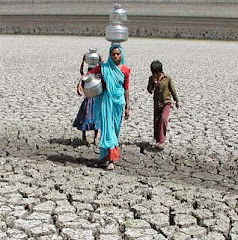India's leading engineering company McNally Bharat Engineering has planned to make a foray into the fast growing water industry in India. The company is eyeing water and wastewater projects in the country.
McNally Bharat Engineering has entered into an exclusive technical partnership agreement with Singapore's leading water technology company Hyflux for this purpose.
The technical partnership will allow McNally Bharat, that undertakes turnkey projects in infrastructure and related manufacturing activities primarily in India, to set up sea water desalination, water and wastewater plants in India. Hyflux has a strong presence in the water desalination industry with projects across the world.
The Indian company is eyeing projects in the industrial, municipal and agricultural sector in India.
"With this tie-up MBE shall be setting strong foot-print in this area in India where there is a strong demand in Sea water desalination project particularly in municipal, agricultural and other industrial usage", a company statement said.
Several Indian companies, engaged in providing engineering services, have turned towards the water industry and remain bullish on the business potential in view of the Indian government's increased spending on infrastructure. The increased focus on water infrastructure and irrigation systems has attracted several companies to make a foray into the sector.
Companies like McNally Bharat expect the renewed focus on water infrastructure sector to culminate in more orders in the irrigation systems, water supply and sewage water treatment space.
The Indian government had raised the allocation for irrigation projects by almost 100per cent to $57 billion USD for the Eleventh Five Year Plan ending 2012.
Showing posts with label water infrastructure. Show all posts
Showing posts with label water infrastructure. Show all posts
Friday, November 20, 2009
India's Jain Irrigation undertakes 'water footprint' project
Jain Irrigation, India's leading manufacturer of water distribution devices and irrigation systems, has charted plans to launch a water footprint initiative aimed at conserving the resource. It has roped in World Bank's private lending arm, International Finance Corporation (IFC) for the endeavour.
The initiative will allow Jain Irrigation to measure its environmental and sustainability benefits and help identify ways for it to reduce water consumption. This is one of the first such moves undertaken in the Indian corporate sector to understand the concept of water footprint.
Water footprinting involves evaluating direct and indirect water usage in business activities, including those of suppliers. It also entails understanding linkages to local water sources and scarcity, and assessing impacts on community water resources and the environment with the goal of adopting conservation measures.
The effort couldn't have come in at a better time. Water supply in the country is waning and pollution is eating into it further. In a country, where agriculture remains the mainstay of rural income, though as a percentage of gross domestic product (GDP) it remains less than one-fourth of a contributor, water availability plays an important role.
The project will demonstrate effective management of natural resources, particularly the benefits to farmers of water conservation. Jain Irrigation is a diversified player in the Indian water infrastructure industry and commands a sizeable presence in agri-business too.
The company claims to be the world’s second-largest drip irrigation systems company after Israel’s Terafin. Its micro-irrigation products are well entrenched in the Indian agriculture industry.
The water footprinting exercise is also expected to bring benefit to several other Indian companies. The project will also aim to develop tools that can be replicated by other private sector companies in ascertaining their direct and their suppliers' water exposure, minimizing water risks, improving water efficiencies, and limiting their water-related social and environmental impacts.
It would be a worthwhile effort for Indian companies, particularly in the water-intensive industries, to tune in and stay abreast with the initiative, and its results. In the near future, it would be prudent for these companies, as also others in India, to undertake water footprinting to not only bring down the usage of the scarce resources, but also understand the future business risk.
The initiative will allow Jain Irrigation to measure its environmental and sustainability benefits and help identify ways for it to reduce water consumption. This is one of the first such moves undertaken in the Indian corporate sector to understand the concept of water footprint.
Water footprinting involves evaluating direct and indirect water usage in business activities, including those of suppliers. It also entails understanding linkages to local water sources and scarcity, and assessing impacts on community water resources and the environment with the goal of adopting conservation measures.
The effort couldn't have come in at a better time. Water supply in the country is waning and pollution is eating into it further. In a country, where agriculture remains the mainstay of rural income, though as a percentage of gross domestic product (GDP) it remains less than one-fourth of a contributor, water availability plays an important role.
The project will demonstrate effective management of natural resources, particularly the benefits to farmers of water conservation. Jain Irrigation is a diversified player in the Indian water infrastructure industry and commands a sizeable presence in agri-business too.
The company claims to be the world’s second-largest drip irrigation systems company after Israel’s Terafin. Its micro-irrigation products are well entrenched in the Indian agriculture industry.
The water footprinting exercise is also expected to bring benefit to several other Indian companies. The project will also aim to develop tools that can be replicated by other private sector companies in ascertaining their direct and their suppliers' water exposure, minimizing water risks, improving water efficiencies, and limiting their water-related social and environmental impacts.
It would be a worthwhile effort for Indian companies, particularly in the water-intensive industries, to tune in and stay abreast with the initiative, and its results. In the near future, it would be prudent for these companies, as also others in India, to undertake water footprinting to not only bring down the usage of the scarce resources, but also understand the future business risk.
Labels:
irrigation,
water footprint,
water infrastructure
Subscribe to:
Posts (Atom)

.jpg)


